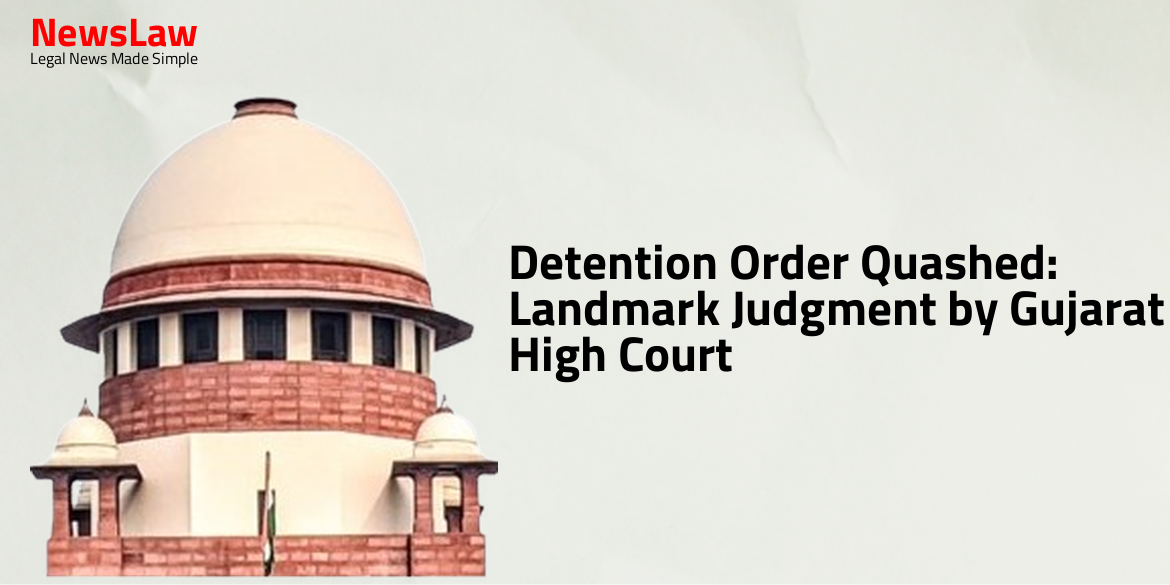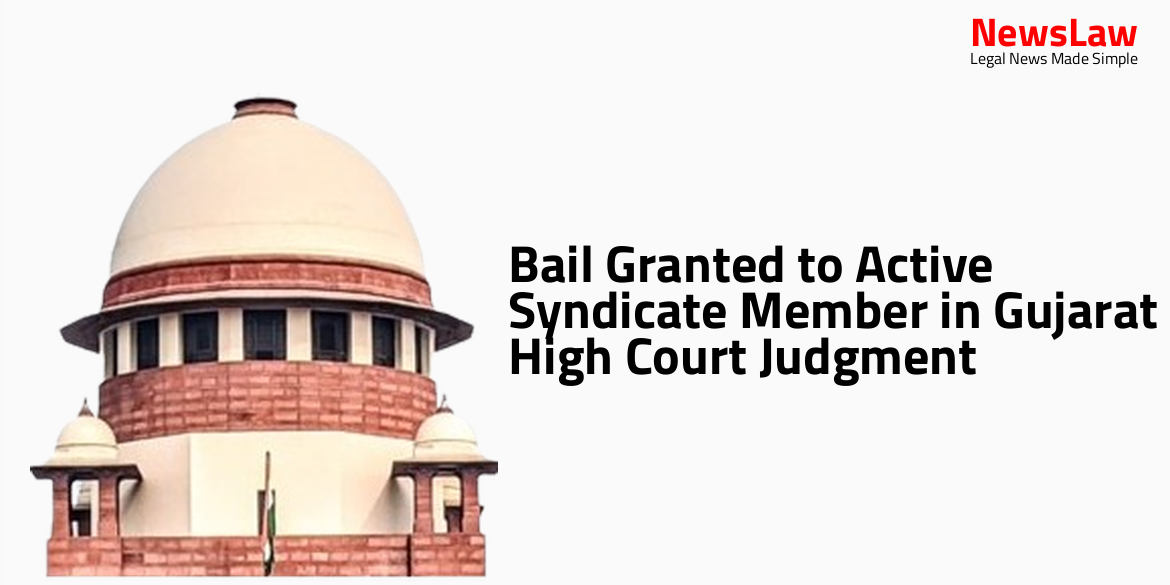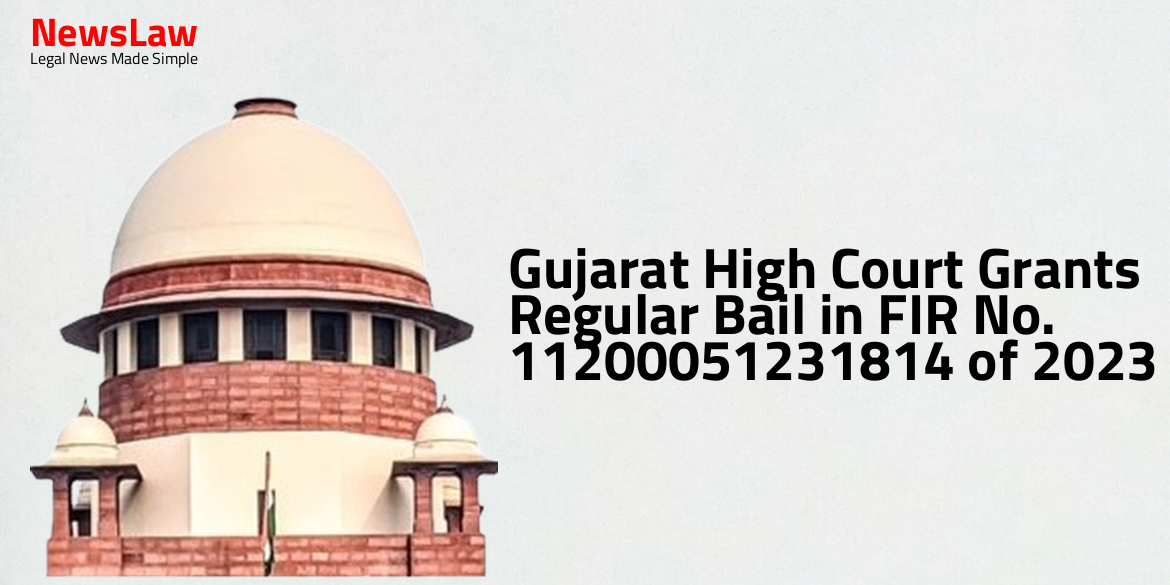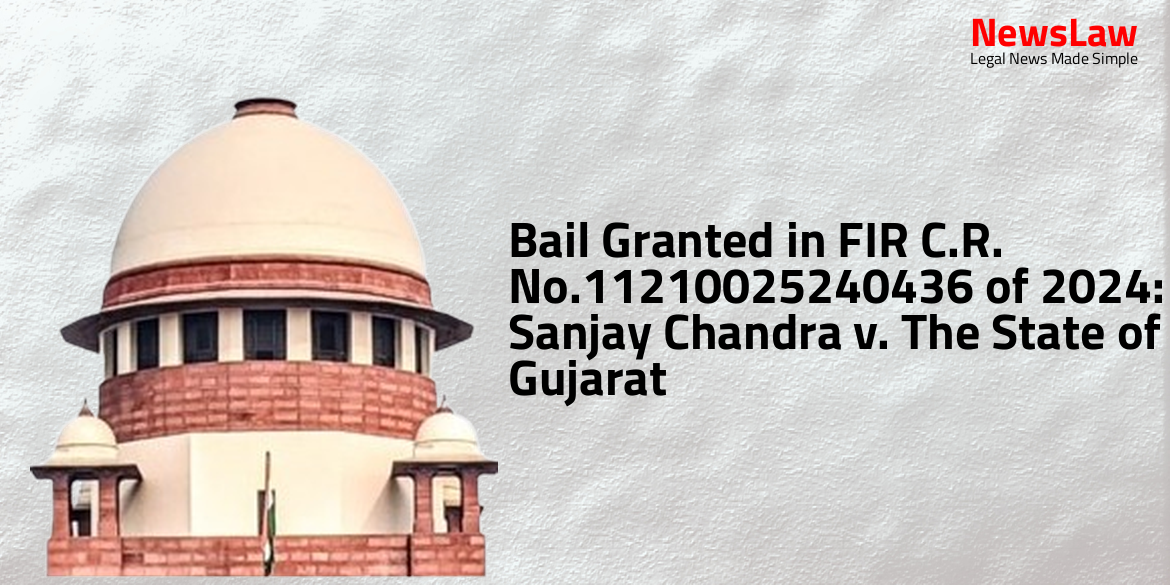In a significant ruling by the Gujarat High Court, a detention order has been quashed, setting a crucial precedent in preventive detention cases. The case involved a challenge to the order of detention dated 04.09.2023 executed on 01.11.2023. Stay updated to understand the implications of this judgment on future legal proceedings and individual rights.
Facts
- The petitioner has challenged the order of detention dated 04.09.2023 passed by the Police Commissioner, Ahmedabad.
- The petitioner has been detained as a ‘dangerous person’ based on two registered offences.
- The order of detention was executed on 01.11.2023.
- The details of the two offenses leading to the detention are provided.
Arguments
- The order of detention is being challenged in the petition.
- It is argued that the registration of offences under the Indian Penal Code alone does not qualify the detenue under section 2(c) of the Act.
- Therefore, the petitioner asserts that the order of detention should be quashed and set aside.
- The detenue’s advocate argues that the alleged offenses of theft of private vehicles do not amount to a breach of public order.
- The option of canceling the detenue’s bail was available to the detaining authority.
- The detenue’s advocate asserts that the alleged illegal activities have no nexus with the maintenance of public order, at most constituting a breach of law and order.
- The FIRs registered against the detenue are under Sections 16 and 17 of the IPC, indicating a ‘dangerous person’.
- The AGP contends that the detaining authority had sufficient material on record, including the detenue’s confession to vehicle theft.
- The detaining authority also considered supporting evidence like the drawing of a panchnama leading to the discovery of the stolen vehicle.
Analysis
- The delay in passing the order of detention without a satisfactory explanation casts doubt on the validity of the detention order.
- The subjective satisfaction of the detaining authority does not appear to be legal or valid as the alleged offenses do not pertain to public order as required by the law.
- There is a disconnect between the grounds of detention and the purpose of detention due to the delay in passing the order.
- The detaining authority did not consider the option of canceling bail as an alternative before resorting to preventive detention.
- The delay of almost five months in passing the detention order raises questions about the necessity and validity of the preventive detention in this case.
- The essential facts regarding the petitioner being granted bail in both cases were not brought to the attention of the detaining authority before passing the detention order.
- The proposition to preventively detain the appellant was made without taking into consideration the option of canceling bail.
- The court finds that seeking recourse to preventive detention was not the appropriate remedy given the circumstances, especially considering the delay in passing the detention order after bail was granted.
- Unreasonable delay between the order of detention and the actual arrest of the detenu, or the proposal and passing of the detention order, is crucial.
- The ‘live & proximate link’ between the grounds of detention and the purpose of detention is essential.
- The distinction between ‘law and order’ and ‘public order’ is clearly laid down in legal precedents.
- Preventive detention aims to protect society by intercepting potential harm before it occurs.
- Delay in executing a detention order can render it ineffective and defeat its purpose.
- An unreasonable and unexplained delay in detaining a person after passing the order vitiates the detention order.
- Not every act of assault or injury constitutes a threat to public order; it must affect the community at large to qualify.
- The subjective satisfaction of the authority to detain must differentiate between serious public disorder and minor breaches of peace.
- Disturbance of law and order is not enough for preventive detention; the disturbance must impact public order to warrant such action.
- Simplicitor registration of FIR/s does not have any nexus with the breach of maintenance of public order.
- Authority cannot have recourse under the Act without relevant and cogent material for invoking power under section 3(2) of the Act.
- Detaining authority showed indifference in passing the detention order promptly after receiving the proposal from the sponsoring authority.
- The ‘live and proximate link’ between the grounds of detention and the purpose of detention was snapped in the case of the detenu.
- The delay in passing the detention order was not explained, and the High Court did not address this issue despite it being raised and argued.
- Previous detention orders against the petitioner were quashed by the Court in three instances.
Decision
- Direct service permitted for the detenue to be set at liberty forthwith if not required in any other case.
- Rule made absolute accordingly.
- The present petition allowed.
- Impugned order of detention dated 04.09.2023 (executed on 01.11.2023) quashed and set aside.
Case Title: ASLAM ALIAS CHOTTU ANVARBHAI MUSTARAHMED SHAIKH Vs. STATE OF GUJARAT
Case Number: R/SCA/21084/2023



